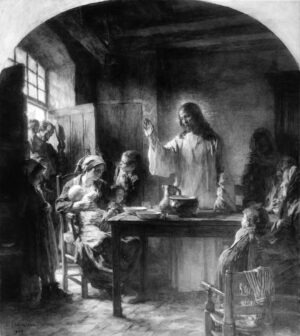Twelfth Sunday after Pentecost
READINGS FOR THE COMING WEEK
- First reading and Psalm
- Jeremiah 2:4-13
- Psalm 81:1, 10-16
- Alternate First reading and Psalm
- Sirach 10:12-18 or Proverbs 25:6-7
- Psalm 112
- Second reading
- Hebrews 13:1-8, 15-16
- Gospel
- Luke 14:1, 7-14
The second reading from Hebrews:
Let mutual love continue. Do not neglect to show hospitality to strangers, for by doing that some have entertained angels without knowing it. Remember those who are in prison, as though you were in prison with them; those who are being tortured, as though you yourselves were being tortured. Let marriage be held in honor by all, and let the marriage bed be kept undefiled; for God will judge fornicators and adulterers. Keep your lives free from the love of money, and be content with what you have; for he has said, “I will never leave you or forsake you.”
So we can say with confidence, “The Lord is my helper; I will not be afraid. What can anyone do to me?” Remember your leaders, those who spoke the word of God to you; consider the outcome of their way of life, and imitate their faith. Jesus Christ is the same yesterday and today and forever. Through him, then, let us continually offer a sacrifice of praise to God, that is, the fruit of lips that confess his name. Do not neglect to do good and to share what you have, for such sacrifices are pleasing to God.
The gospel from Luke:
On one occasion when Jesus was going to the house of a leader of the Pharisees to eat a meal on the sabbath, they were watching him closely. When he noticed how the guests chose the places of honor, he told them a parable.

1905 Lhermitte, Léon Augustin, 1844-1925
Metropolitan Museum of Art
:New York, NY
https://diglib.library.vanderbilt.edu
“When you are invited by someone to a wedding banquet, do not sit down at the place of honor, in case someone more distinguished than you has been invited by your host; and the host who invited both of you may come and say to you, ‘Give this person your place,’ and then in disgrace you would start to take the lowest place. But when you are invited, go and sit down at the lowest place, so that when your host comes, he may say to you, ‘Friend, move up higher’; then you will be honored in the presence of all who sit at the table with you.
For all who exalt themselves will be humbled, and those who humble themselves will be exalted.” He said also to the one who had invited him, “When you give a luncheon or a dinner, do not invite your friends or your brothers or your relatives or rich neighbors, in case they may invite you in return, and you would be repaid. But when you give a banquet, invite the poor, the crippled, the lame, and the blind.
And you will be blessed, because they cannot repay you, for you will be repaid at the resurrection of the righteous.”
Sermon
Pastor Stevensen says that pastors in general like both the Old and the New Testaments. Why should we care about the Old Testament? The New Testament refers many times to the Old. The Old Testament is remarkable in expressing faith in God. In Genesis we may read about the three visitors Abraham to whom he showed hospitality. In the Old Testament we learn about the nature of God. This helps us to understand our gospel lesson. Our lesson in Hebrews says to “not neglect to entertain strangers, for by doing that some have entertained angels.” In Luke, Jesus says “Do not invite your friends, relatives or rich neighbors. …Invite the poor, the crippled and the blind.” This is contrary to the culture of the time. He says “You will be blessed ….for you will be repaid at the resurrection of the righteous.” Jesus is teaching those less fortunate. Why teach these people? God is generous. He is “wildly extravagant.” The visitors all come without money. God is generous to all people. Generosity is displayed in other parables, as in the seed, meaning the Word, sowed everywhere, and as in the father who is generous to his prodigal son. God is magnificently generous……..

